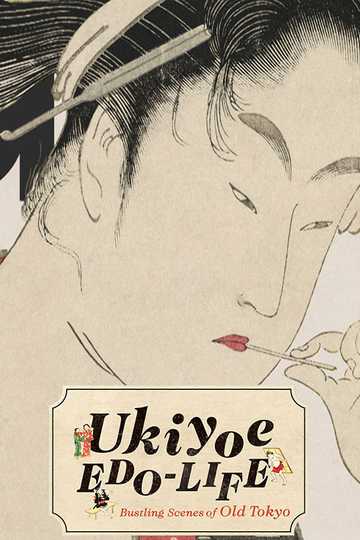Season 2 Episodes
1. Two Faces of Mount Fuji
We observe "Red Fuji" and "Black Fuji," 2 dramatically different views of Japan's most famous mountain, captured by the artist Hokusai. What did Mount Fuji mean to the people of Edo? "Southern Wind at Clear Dawn," "Rainstorm beneath the Summit" from the series "Thirty-six views of Mount Fuji" (1830-31) by Katsushika Hokusai
2. The Man with the Piercing Gaze
A man strikes a pose in an iconic woodblock print by the artist Sharaku. Who is the mysterious figure ... and what is he doing? And why did the artist want to commemorate the moment? "The Actor Otani Oniji III as Edobei" (1794) by Toshusai Sharaku
3. Comfort Food on a Snowy Night
We come across a tranquil, snow-covered Edo cityscape. But there's something in the air -- the aroma of foods both sweet and savory that helped the townspeople keep warm in the winter. "Bikuni Bridge in Snow," from the series "One Hundred Famous Views of Edo" (1858) by Utagawa Hiroshige
4. Braving the Rain and the Currents
Caught in an evening shower, Edo townspeople scramble across a bridge in search of shelter. On the river beyond, a lone figure steers his boat, unfazed by the rain. What is his destination? "Sudden Shower over Shin-Ohashi Bridge and Atake," from the series "One Hundred Famous Views of Edo" (1857) by Utagawa Hiroshige
5. A Summer Bedtime Routine
On those hot, humid summer nights, nothing can get in the way of sleep like mosquitoes on the hunt. We learn about the tools the Edo townspeople had at their disposal to fight the pesky insects. "Woman beside a Mosquito Net," from the series "Starlight Frost and Modern Manners" (c.1819) by Utagawa Kunisada
6. Inner Conflict of the Human Soul
We visit the Yoshiwara district, Edo's most prominent pleasure quarters. Among the lavish spenders, courtesans and apprentices, small humanoid creatures scurry about -- what could they be up to? "Good and Evil Influences in the Yoshiwara" (c.1800) by Eishosai Choki
7. A Secret Comes to Light
It's late at night. When all are fast asleep, a young man and woman huddle together along the veranda outside of a house, attending to a ... rooster. What could the pair be up to? "Making the Rooster Drunk to Prevent His Crowing at Dawn" (1767-68) by Suzuki Harunobu
8. Eat Drink and Enjoy the Flowers
We visit one of the most famous cherry blossom spots in Edo. Flower viewing parties were for eating, drinking and making merry. It was also an opportunity for young men and women to mingle. "Flower Viewing at Mimeguri Shrine" (1799) by Kitagawa Utamaro
9. Doodles? Or Ukiyoe?
A series of doodles by the famous artist Utagawa Kuniyoshi turn out to be carefully considered depictions of the kabuki actors of the day. What kind of artistic statement was he trying to make? "Scribbles on a Warehouse Wall" (1848) by Utagawa Kuniyoshi
10. The Building Blocks of Edo
Workers at a sawmill use the latest tools and their honed skills to prepare the building blocks of Edo life: long, narrow beams, bamboo stems and leftover wood stacked as high as buildings. "Tatekawa in Honjo" from the series "Thirty-six Views of Mount Fuji" (c.1830) by Katsushika Hokusai
11. A Community Comes Together
In the Edo period, childbirth was a community affair, with the mother-to-be attended by a midwife and the women in her life. It was also characterized by unique customs and superstitions. "The Birth of the First Child" sheet 7 of the series "Marriage in Brocade Prints, the Carriage of the Virtuous Woman, known as the Marriage series" (c.1769) by Suzuki Harunobu
12. Mother Nature's Summer Light Show
We venture to the outskirts of Edo just after sunset, where a group of women and children have come to a stream to enjoy a popular summer activity. What could they be looking for among the weeds? "Catching Fireflies" (1796-1797) by Kitagawa Utamaro
13. Fishing for a Summer Delicacy
A group of anglers stand in a fast-moving, undulating river at the foot of a rugged cliff. They use "drifting mosquito hooks" to fish for a summer delicacy that was a favorite of the Edo townspeople. "Fly-fishing" from the series "One Thousand Pictures of the Ocean" (c.1833) by Katsushika Hokusai
14. A Night of Fashion and Fireworks
For a time during the Edo period, fireworks lit up the skies practically every night in the summer. It was a chance for women to dress up and let loose ... and grab the attention of male suitors. "Women Watching Fireworks at Sumida River" (1795-96) by Kitagawa Utamaro
15. Rush Hour in Old Tokyo
Edo was a city of waterways. The Yoroi Ferry transported people across the Nihonbashi River, one of its main commercial arteries. For the captain, it was a high-pressure job requiring skill and guts. "The Yoroi Ferry" from the series "Fine Views of Edo" (1835-39) by Utagawa Hiroshige











